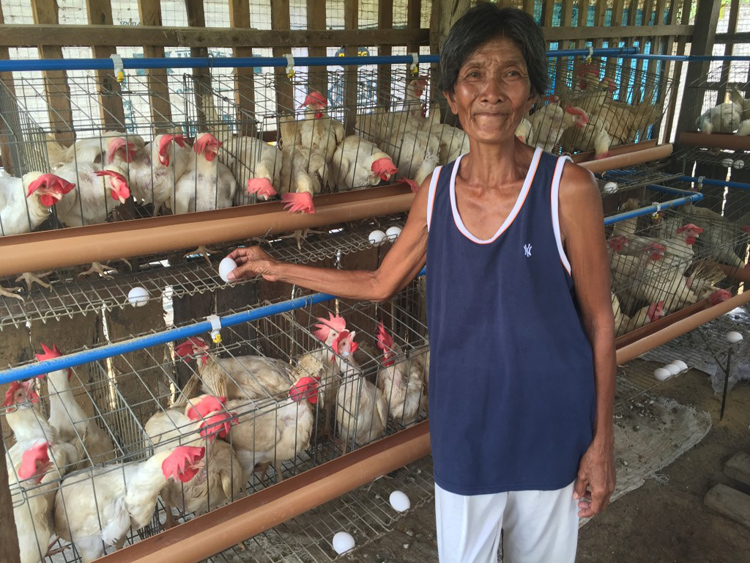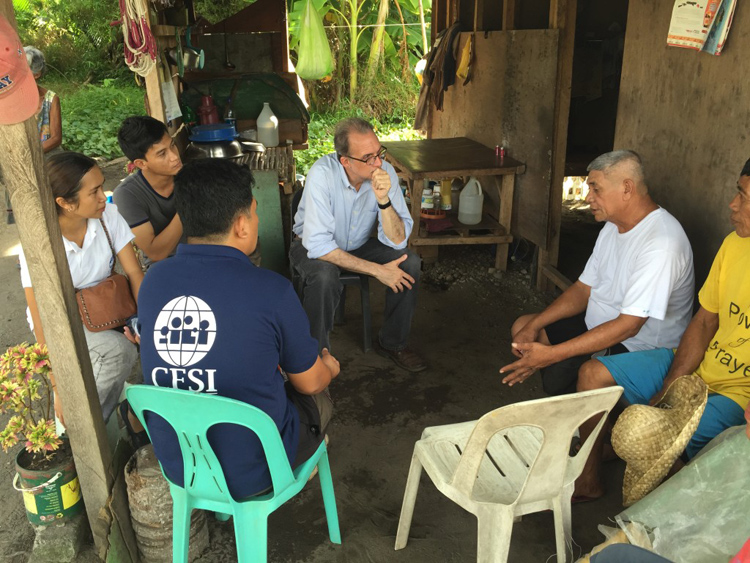Field visits are important for many reasons. They provide the opportunity to hear directly from those we are trying to help, as well as the opportunity to learn more from colleagues — many of whom serve in difficult and oft-times dangerous environments. Recently, I travelled to areas affected by the super-typhoon Haiyan (Yolanda) disaster in Eastern Visayas and from 7 to 10 June, to Zamboanga City, Mindanao, which was badly affected by armed conflict in late 2013. During the first mission, I was accompanied by Associate Programme Officer Myo Myint Than (Oscar), who is from Myanmar, and Communications Associate Anne Haley from the USA. Oscar continued on to Zamboanga whilst Anne returned to our duty station in Metro Manila.
During these back-to-back missions to two very different parts of the Philippines, we met with persons who had survived natural disasters, armed conflict, chronic poverty, hostage-taking, and kidnapping. Almost all had been displaced from their communities and homes; many remained in evacuation centers or transitory facilities, awaiting resettlement, ideally to permanent homes, or some as-of-yet unidentified solution to their difficult situation. We spoke with children and adolescents, teen-agers, young adults, parents, elderly individuals, persons with disabilities, volunteers, community leaders, religious leaders, local government officials, businessmen/women, and colleagues working in other organisations. Almost everyone reported progress and improvements, even as they identified areas needing additional attention and called for quicker action.

Adelaida, the caretaker of an egg laying livelihood programme in in Marabut, shows off her happy hens.
I was struck, yet again, by the warmth and the resiliency of those who had lost everything — including loved ones. I was moved by the gratitude people expressed everywhere, even though many had far too little in the way of shelter, food, access to basic services, and opportunity to earn a living. It was also clear by the teary eyes and shaking hands that many still felt the pain that comes with loss, for which I could only offer listening ears, a few words of encouragement, an arm on the shoulder, or an embrace of solidarity.
There were many people in the twenty different communities we visited who inspired us, made us laugh, and challenged us. For example, there was the widow in Marabut who spends most of her days as care-taker of a large number of hens whose eggs–roughly 100 a day–provide a source of income for her and her four children and the other women participating in that particular livelihood project. She taught us traditional approaches to keeping chickens healthy as well as productive and sang for us the song she sings to the chickens to encourage them to lay more eggs. A barangay (village) captain in Guiuan, impressed us with his determination to reduce the risk of another deadly disaster in his community. He asked for training from CFSI and informed us that he had already allocated some funds towards the snacks that would be provided to those residents who participated in such training. Among those still awaiting housing solutions in Zamboanga City was an elderly religious leader who needs capital to re-start his small, used clothing business and, more importantly, income to cover the P40 per week cost of travelling from the transitory shelter to the hospital every week to address the issues associated with his catheter. Lastly, but not least, was the gracious widow, mother of five, who served us soft drinks from her very small, home-front store (sari-sari store), as she shared her effort to recover from being a hostage for nearly three weeks with three children shot during the crossfire.

Executive Director, Steve Muncy, discusses the progress of a aquaculture livelihood programme in Tanauan, Leyte.
Moving, inspiring, powerful, never to be forgotten, stories of real people dealing with incredibly tough situations–each told by people who seemed far more gracious and giving than I can ever hope to be.
As to the staff and volunteers of CFSI, wonderful, truly wonderful. Dedicated, hard-working, each with her/his own story to tell, many leaving families behind to help families with nothing left behind. I was called higher by their performance, attitude, spirit, and aspirations for the people we are committed to serving. To them, and the many, many more we met, I offer my gratitude.
Steven Muncy
Executive Director

